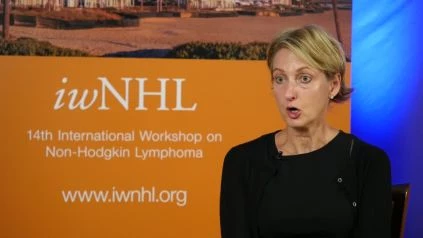“Laurie Sehn, MD of British Columbia Cancer Agency, Vancouver, Canada discusses the use of PET scan to identify diffuse large B-cell lymphoma (DLBCL) who will do poorly on frontline therapy. Dr Sehn points out that DLBCL is a challening diseae to treat; many patients are cured with R-CHOP therapy (rituximab, cyclophosphamide, doxorubicin, vincristine, and prednisone) but those patients who aren’t cured with frontline therapy, do very poorly. Therefore, it is important to identify the patients who will do poorly earlier in order to consider alternative therapies. She discusses a Phase II trial looking at the use of interim PET scan in patients with DLBCL to identify those patients who will do poorly (NCT00324467); patients underwent a PET scan after four cycles of R-CHOP therapy and if it was negative, they continued with standard therapy but patients with a positive PET scan received a salvage regiment with R-ICE (rituximab, ifosfamide, carboplatin, etoposide). They found that 60% of patients were PET negative and in terms of PET positive patients, they found that switching from R-CHOP to R-ICE was difficult; some patients did not tolerate it and of those who switched, the majority still had a positive PET scan after the treatment was complete.
Recorded at the 2016 International Workshop on Non-Hodgkin Lymphoma (iwNHL) meeting held in San Diego, CA.”
[the_ad id="32629"]

